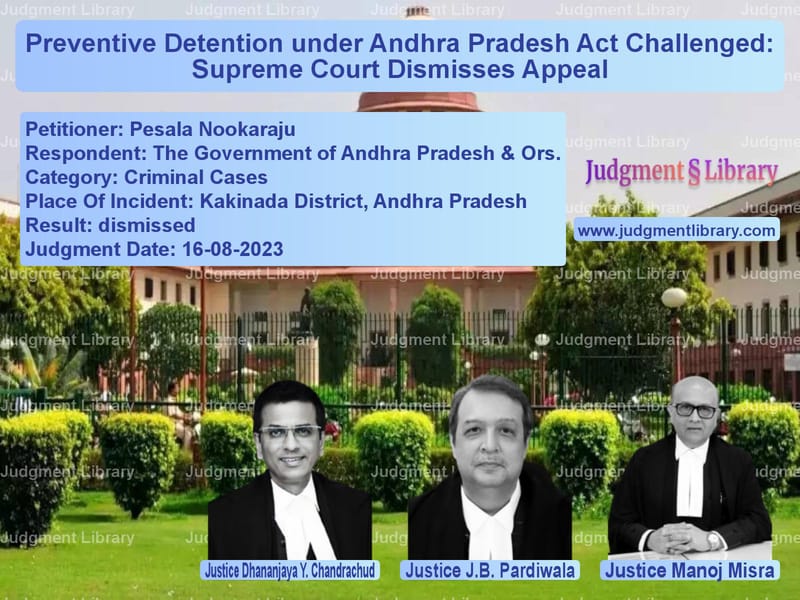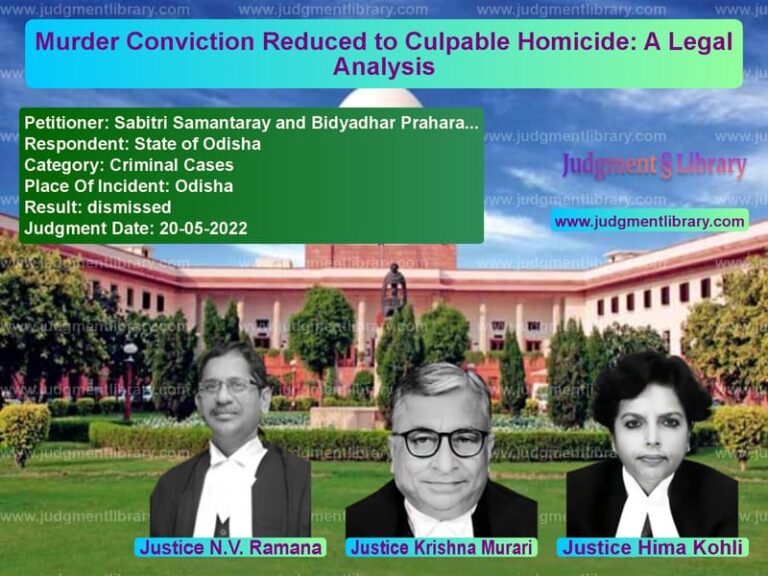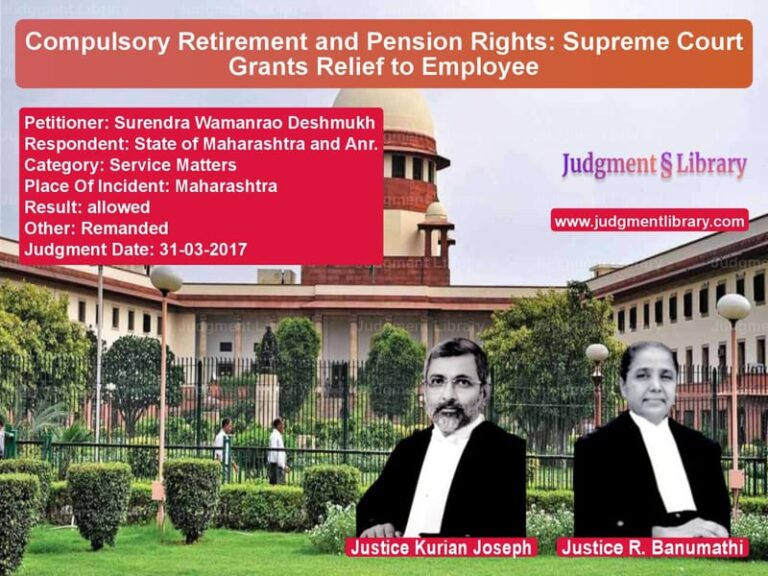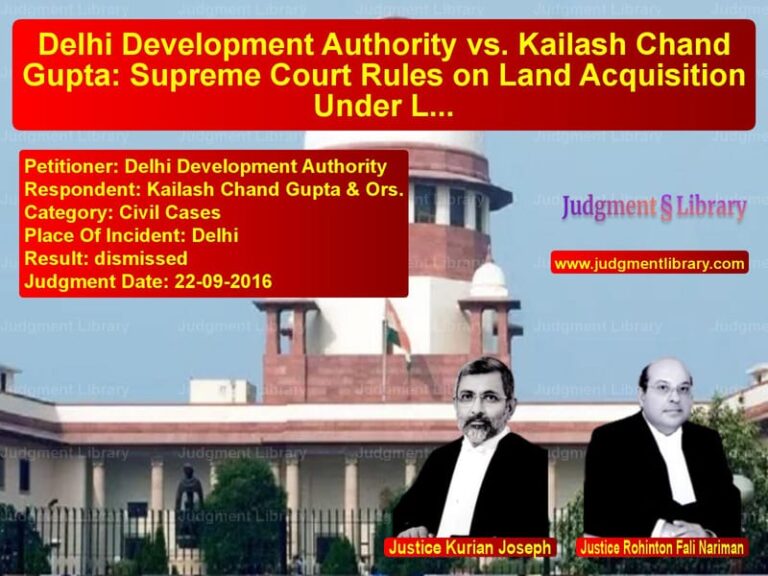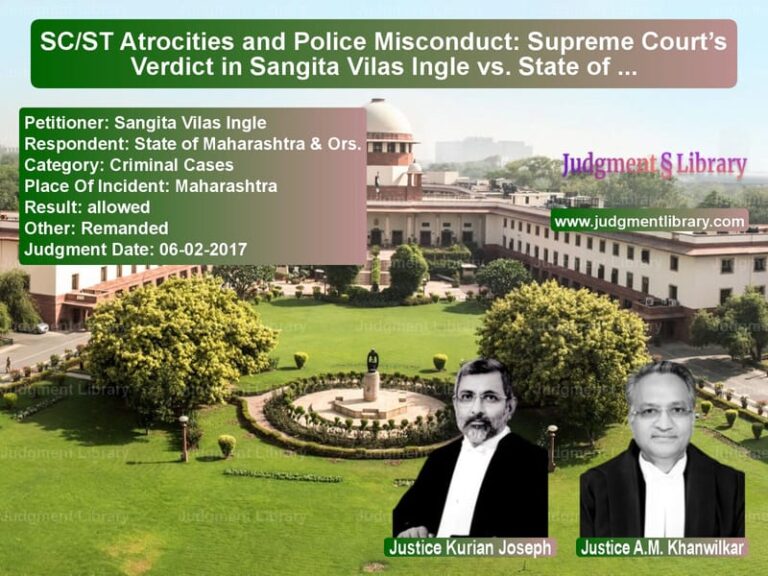Preventive Detention under Andhra Pradesh Act Challenged: Supreme Court Dismisses Appeal
The case of Pesala Nookaraju vs. The Government of Andhra Pradesh & Ors. revolves around the legality of the preventive detention of the petitioner under the Andhra Pradesh Prevention of Dangerous Activities of Boot-leggers, Dacoits, Drug Offenders, Goondas, Immoral Traffic Offenders and Land Grabbers Act, 1986. The Supreme Court upheld the detention, emphasizing the necessity of preventive detention to maintain public order while ensuring that procedural safeguards were adhered to.
The petitioner, Pesala Nookaraju, was detained under the Act on allegations of being a habitual offender involved in bootlegging and other illegal activities that disturbed public peace. The detaining authority passed the order citing past incidents that demonstrated a pattern of repeated offenses. The petitioner challenged the detention on the grounds of procedural violations, lack of justification, and misuse of preventive detention laws.
Background of the Case
The petitioner was accused of engaging in bootlegging activities that resulted in public nuisance and law and order disturbances. His activities were reportedly persistent, despite multiple legal actions against him. The detaining authority justified the preventive detention order based on his prior record and the continued risk he posed to society.
The sequence of events in the case is as follows:
- March 2023: The detaining authority in Kakinada District issued a detention order against the petitioner under the Andhra Pradesh Prevention of Dangerous Activities Act.
- April 2023: The petitioner filed a writ petition in the Andhra Pradesh High Court challenging the detention.
- June 2023: The High Court dismissed the petition, upholding the detention order.
- August 2023: The petitioner appealed to the Supreme Court, arguing that the detention order violated constitutional rights.
Key Legal Issues Considered
The Supreme Court examined the following legal aspects:
- Whether the detention order complied with procedural requirements under the Andhra Pradesh Act.
- Whether the petitioner’s activities posed a sufficient threat to public order to justify preventive detention.
- Whether the detention order violated fundamental rights under Articles 21 and 22 of the Constitution.
Arguments by the Petitioner
The petitioner contended:
- The detention order was issued without proper justification and violated his fundamental rights.
- The incidents cited by the detaining authority did not constitute a sufficient threat to public order.
- The detention was politically motivated and intended to silence him rather than maintain public peace.
- His past criminal record, if any, had already been addressed through due legal process, making preventive detention unnecessary.
Arguments by the Respondents
The Government of Andhra Pradesh defended the detention, arguing:
- The petitioner had a long history of bootlegging activities that repeatedly caused disturbances.
- Previous legal actions, including criminal prosecutions, had failed to deter him from engaging in illegal activities.
- Preventive detention was necessary to protect public order and prevent further offenses.
- The detaining authority followed all due process requirements before issuing the detention order.
Supreme Court’s Analysis and Judgment
1. Justification for Preventive Detention
The Court noted that preventive detention is an exceptional measure meant to prevent future crimes rather than punish past conduct. It stated:
“Preventive detention is justified when an individual’s activities pose a clear and imminent threat to public order. The detaining authority must provide reasonable grounds for its decision.”
The Court found that the detaining authority had sufficient material to conclude that the petitioner’s continued presence in society posed a risk.
2. Procedural Compliance
The Court examined whether the detention order adhered to procedural safeguards under the Andhra Pradesh Act. It observed:
“The procedural requirements under preventive detention laws serve as safeguards against arbitrary state action. In this case, the detaining authority followed due process, ensuring the petitioner’s rights were not unjustly violated.”
The Court held that all necessary procedural formalities were fulfilled, making the detention legally valid.
3. Threat to Public Order
The Court distinguished between disturbances of law and order and public order, stating:
“Mere criminal activity does not warrant preventive detention unless it significantly impacts public order. The petitioner’s activities went beyond individual criminal acts and created disruptions at a broader level.”
Based on the evidence, the Court upheld the finding that the petitioner’s actions threatened public order.
4. Constitutional Validity
The petitioner argued that his detention violated Articles 21 and 22 of the Constitution. The Court ruled:
“The right to personal liberty is fundamental, but preventive detention is constitutionally permitted under Article 22 when used in accordance with established procedures.”
Since the detention order was legally issued, the Court rejected the constitutional challenge.
Supreme Court’s Final Decision
The Supreme Court dismissed the appeal, upholding the detention order:
- The preventive detention order was found to be legally justified.
- The petitioner’s activities posed a continuing threat to public order.
- Due process was followed, ensuring the detention’s legality.
- There was no violation of fundamental rights.
Conclusion
This judgment reinforces key legal principles:
- Preventive detention is justified only when a real threat to public order exists.
- Procedural compliance is essential to uphold the validity of detention orders.
- Preventive detention is distinct from regular criminal proceedings.
- Fundamental rights are subject to reasonable restrictions under preventive detention laws.
This ruling sets a precedent for how preventive detention cases should be evaluated, ensuring a balance between individual rights and public safety.
Petitioner Name: Pesala Nookaraju.Respondent Name: The Government of Andhra Pradesh & Ors..Judgment By: Justice Dhananjaya Y. Chandrachud, Justice J.B. Pardiwala, Justice Manoj Misra.Place Of Incident: Kakinada District, Andhra Pradesh.Judgment Date: 16-08-2023.
Don’t miss out on the full details! Download the complete judgment in PDF format below and gain valuable insights instantly!
Download Judgment: pesala-nookaraju-vs-the-government-of-an-supreme-court-of-india-judgment-dated-16-08-2023.pdf
Directly Download Judgment: Directly download this Judgment
See all petitions in Bail and Anticipatory Bail
See all petitions in Custodial Deaths and Police Misconduct
See all petitions in Judgment by Dhananjaya Y Chandrachud
See all petitions in Judgment by J.B. Pardiwala
See all petitions in Judgment by Manoj Misra
See all petitions in dismissed
See all petitions in supreme court of India judgments August 2023
See all petitions in 2023 judgments
See all posts in Criminal Cases Category
See all allowed petitions in Criminal Cases Category
See all Dismissed petitions in Criminal Cases Category
See all partially allowed petitions in Criminal Cases Category

